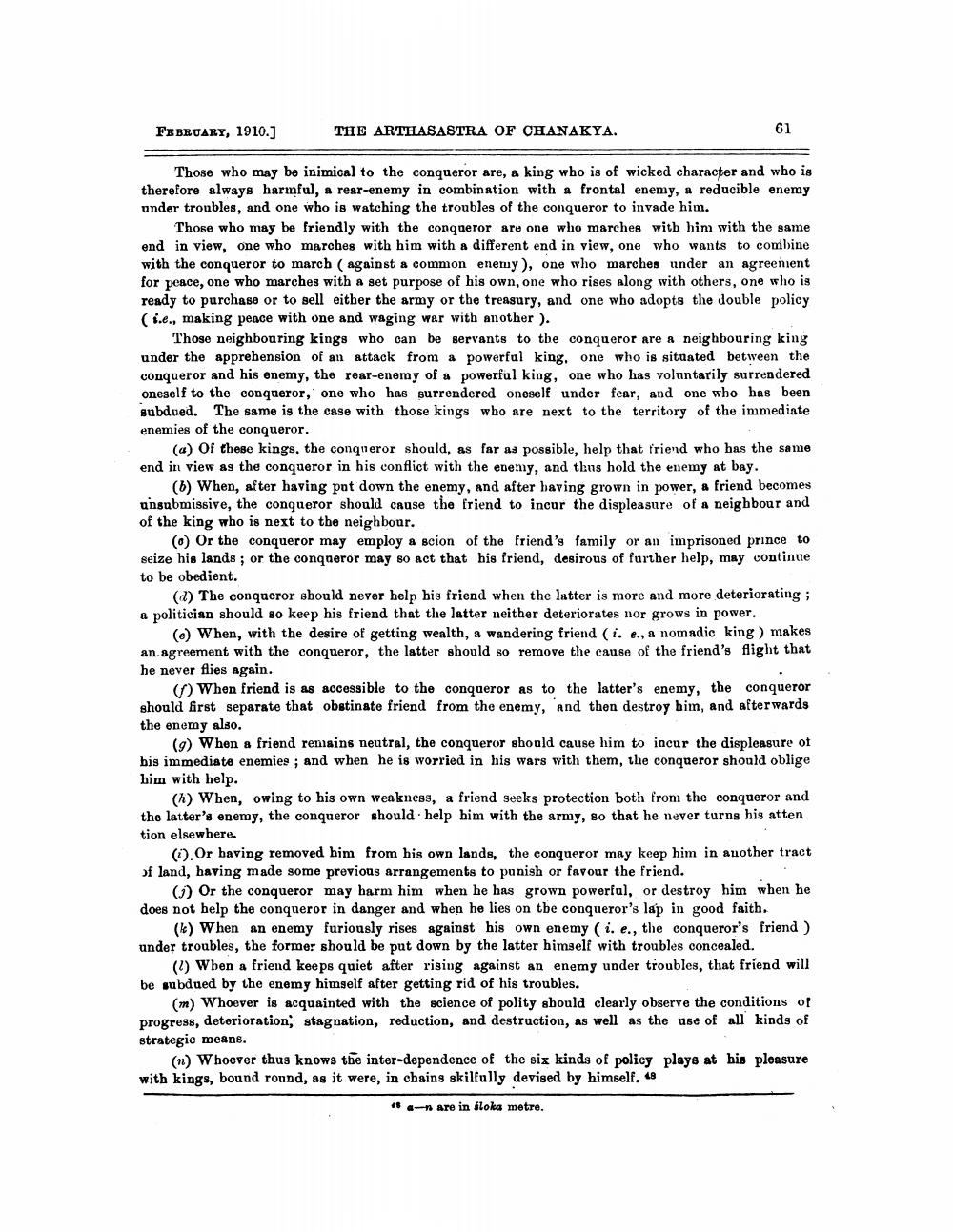________________
FEBRUARY, 1910.]
THE ARTHASASTRA OF CHANAKYA.
Those who may be inimical to the conqueror are, a king who is of wicked character and who is therefore always harmful, a rear-enemy in combination with a frontal enemy, a reducible enemy under troubles, and one who is watching the troubles of the conqueror to invade him.
Those who may be friendly with the conqueror are one who marches with him with the same end in view, one who marches with him with a different end in view, one who wants to combine with the conqueror to march against a common enery), one who marches under an agreenient for peace, one who marches with a set purpose of his own, one who rises along with others, one who is ready to purchase or to sell either the army or the treasury, and one who adopts the double policy (1.e., making peace with one and waging war with another ).
Those neighbouring kings who can be servants to the conqueror are a neighbouring king under the apprehension of an attack from a powerful king. one who is situated between the conqueror and his enemy, the rear-enemy of a powerful king, one who has voluntarily surrendered oneself to the conqueror, one who has surrendered oneself under fear, and one who has been subdued. The same is the case with those kings who are next to the territory of the immediate enemies of the conqueror.
(a) Of these kings, the conqueror should, as far as possible, help that friend who has the same end in view as the conqueror in his conflict with the enemy, and thus hold the enemy at bay.
(6) When, after having put down the enemy, and after having grown in power, a friend becomes unsubmissive, the conqueror should cause the friend to incur the displeasure of a neighbour and of the king who is next to the neighbour.
(6) Or the conqueror may employ a scion of the friend's family or an imprisoned prince to seize his lands; or the conqueror may so act that his friend, desirous of further help, may continue to be obedient.
(a) The conqueror should never help his friend when the latter is more and more deteriorating; a politician should so keep his friend that the latter neither deteriorates nor grows in power.
(@) When, with the desire of getting wealth, a wandering friend (i. e., a nomadic king) makes an agreement with the conqueror, the latter should so remove the cause of the friend's flight that he never flies again.
When friend is as accessible to the conqueror as to the latter's enemy, the conqueror should first separate that obstinate friend from the enemy, and then destroy him, and afterwards the enemy also.
(9) When a friend remains neutral, the conqueror should cause him to incur the displeasure of bis immediate enemies; and when he is worried in his wars with them, the conqueror should oblige him with help.
(h) When, owing to his own weakness, a friend seeks protection both from the conqueror and the latter's enemy, the conqueror should help him with the army, so that he never turns his atten tion elsewhere.
1). Or baving removed him from his own lands, the conqueror may keep him in another tract of land, having made some previous arrangements to panish or favour the friend.
(1) Or the conqueror may harm him when he has grown powerful, or destroy him when he does not help the conqueror in danger and when he lies on the conqueror's lap in good faith,
(b) When an enemy furiously rises against his own enemy (i. e., the conqueror's friend ) under troubles, the former should be put down by the latter himself with troubles concealed.
(2) When a friend keeps quiet after rising against an enemy under troubles, that friend will be subdued by the enemy himself after getting rid of his troubles.
(m) Whoever is acquainted with the science of polity should clearly observe the conditions of progress, deterioration, stagnation, reduction, and destruction, as well as the use of all kinds of strategic means.
(n.) Whoever thus knows the inter-dependence of the six kinds of policy plays at his pleasure with kings, bound round, as it were, in chains skilfully devised by himself. 18
--
are in Sloka metre.




